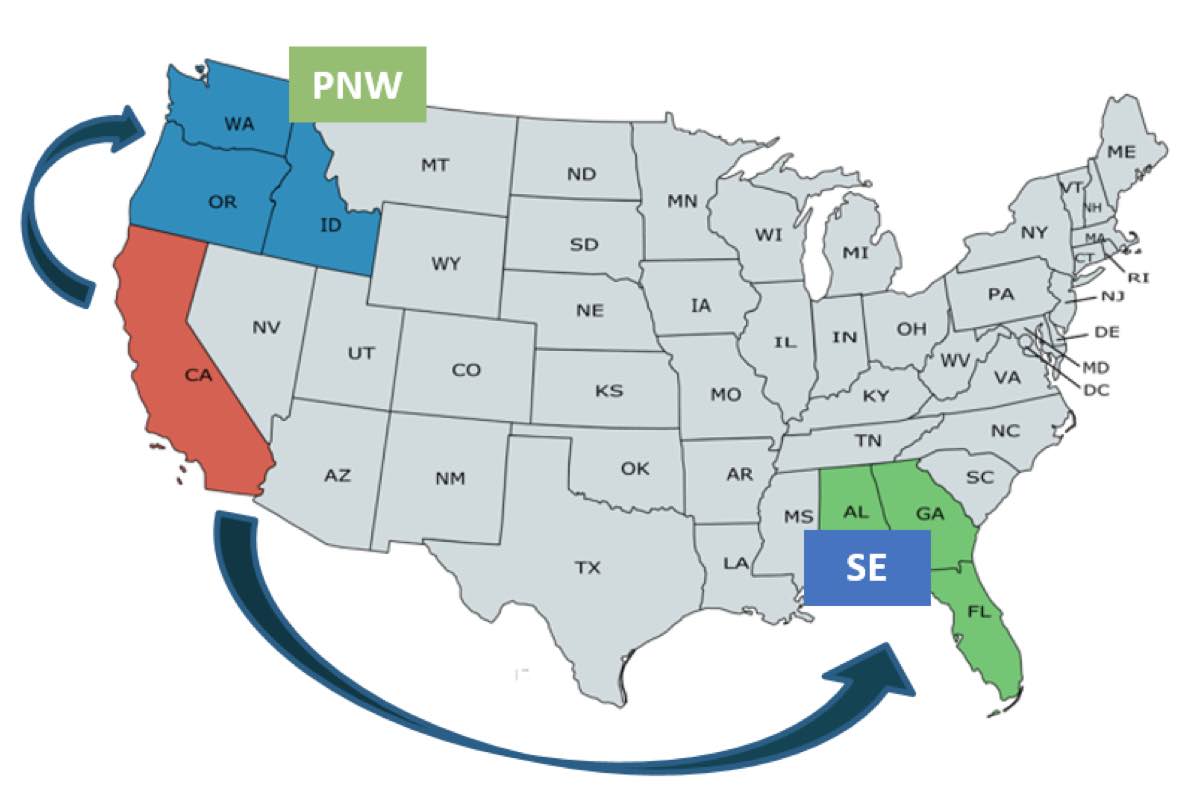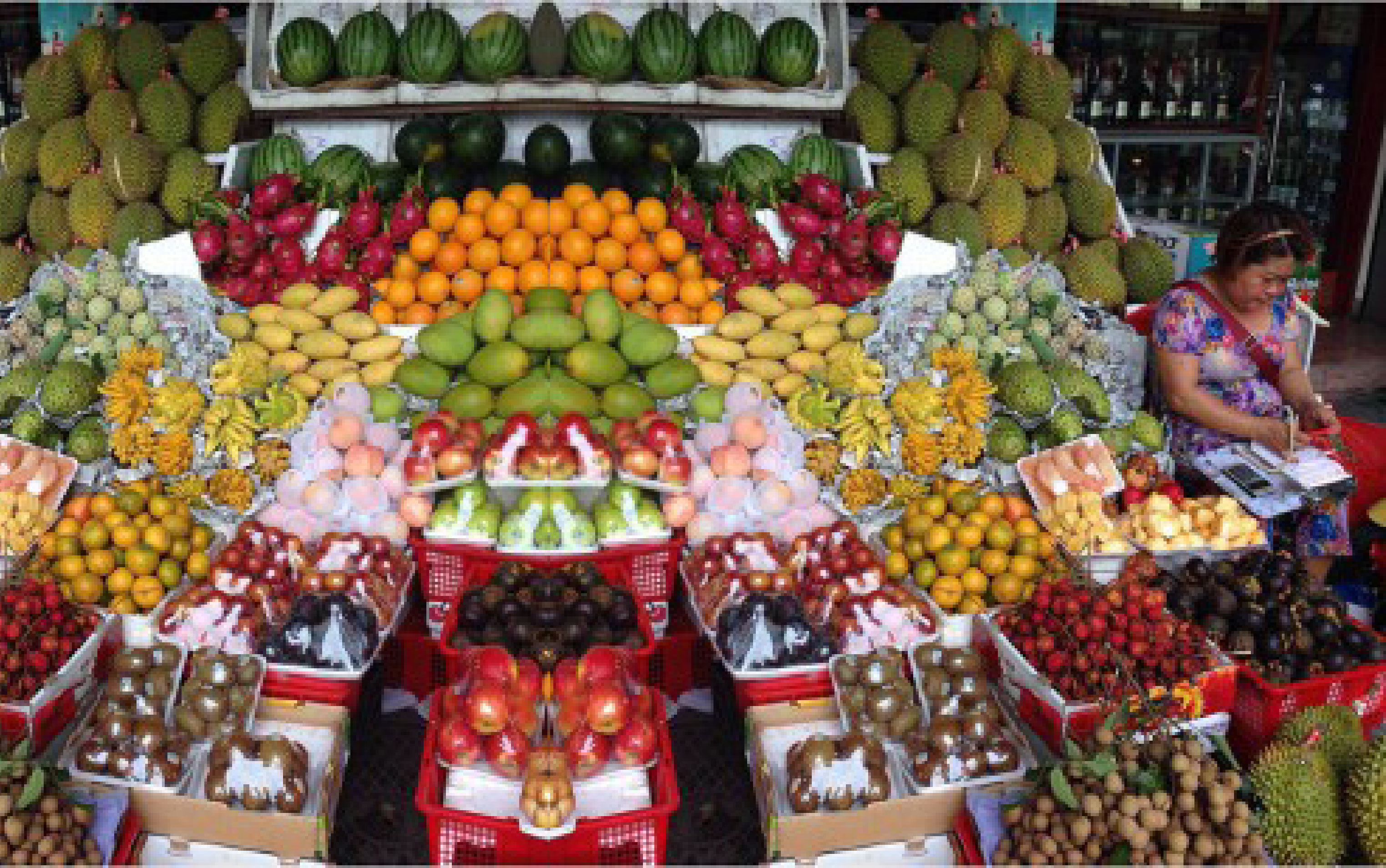Fruits and Vegetables
Main Contact for Initiative
D. Gustafson and S. Asseng
Fruits & Vegetable Supply Chains: Climate Adaptation & Mitigation Opportunity
Enhancing the productivity, resilience, and sustainability of domestic produce supply chains
Americans are encouraged to eat more fruits and vegetables as part of a healthy, balanced diet. However, meeting increased demand for these highly nutritious foods will be challenging for domestic production regions in the United States. California is the leading domestic source of many fruit and vegetable crops, but climate change coupled with increased competition for land, water and other natural resources will likely limit greater production in that state (see Figure 1).
Fruit and vegetable production is only one aspect of overall food system performance. Before reaching consumers, fruits and vegetables pass through many steps: processing, transport, storage, preparation, consumption, and (unfortunately) generation of waste. All of these post-harvest steps consume energy, water, and other resources as well as emitting the very greenhouse gases (GHGs) that contribute to climate change.

Figure 1. One key aspect of this new USDA National Institute of Food and Agriculture project, “Climate Adaptation and Mitigation in Fruit and Vegetable Supply Chains,” will be the exploration of strategies and land use change resulting from the potential relocation (arrows) of certain crops from California to production regions in the Pacific Northwest (PNW) and Southeast (SE).
In recent years, public and private sector organizations have shared a range of perspectives and experiences on what is needed for a model-based sustainability assessment of future domestic production, availability, and price for representative fruits and vegetables. Advancing this kind of an assessment requires a skilled, multi-disciplinary, multi-institutional team of researchers, educators, and extension specialists. To that end, the ILSI Research Foundation and the University of Florida assembled exactly such a team, which has just been awarded a four-year grant from the United States Department of Agriculture National Institute of Food and Agriculture for the project “Climate Adaptation and Mitigation in Fruit and Vegetable Supply Chains.”
Co-led by Dr. Senthold Asseng, University of Florida and Dr. David Gustafson, representing the ILSI Research Foundation, the project team also includes scientists, extension specialists, practitioners and students from the International Food Policy Research Institute, University of Arkansas, University of Illinois, Washington State University, and World Agricultural Economic and Environmental Services.
The researchers will use crop modeling, economic modeling, and environmental modeling to determine current and future climate and water availability impacts on yield, quality, price, and environmental profile of selected fruit and vegetable crops, specifically: carrots, green beans, oranges, potatoes, spinach, strawberries, sweet corn, and tomatoes. The focus will be on strategies and land use change resulting from relocation of crops from California to new regions in the Pacific Northwest and Southeast. Using this integrated, collaborative approach, the team will help the US maintain a nutritious, reliable, affordable, and environmentally-sound food supply.
A session is being planned for the upcoming AgMIP7 Global Workshop in San José, Costa Rica (April 24-26, 2018) on potential opportunities for members of the AgMIP community to collaborate on this work, especially on new modeling approaches for these crops. For more information on this session, please contact Senthold Asseng (sasseng@ufl.edu, +1-352-392-1864;221).
Prior Updates
Main Contact for Initiative
D. Gustafson and S. Asseng
Building on a recently funded NIFA project led by Dr. Dave Gustafson and Dr. Senthold Asseng, the AgMIP7 Global Workshop included a session examining methods to modeling fruits and vegetable supply chains. The session aimed to promote opportunities for members of the Agricultural Model Intercomparison and Improvement Project (AgMIP) community to collaborate on issues related to the fruit and vegetable supply chain.

The session was derived by the new AgMIP North America initiative to address fruit and vegetable consumption in the United States. “The AgMIP methodology has proven very valuable in promoting collaboration amongst researchers to compare and advance crop models to better project impacts on current and future yields,” acknowledges AgMIP Executive Committee Member Senthold Asseng. “We are very excited to utilize this methodology in addressing the challenges for the fruit and vegetable supply chain.”
Motivation
Americans are encouraged to eat more fruits and vegetables as part of a healthy, balanced diet. However, meeting increased demand for these highly nutritious foods will be challenging for domestic production regions in the United States. California is the leading domestic source of many fruit and vegetable crops, but climate change coupled with increased competition for land, water and other natural resources will likely limit greater production in that state (see Figure 1).
In recent years, public and private sector organizations have shared a range of perspectives and experiences on what is needed for a model-based sustainability assessment of future domestic production, availability, and price for representative fruits and vegetables. Advancing this kind of an assessment requires a skilled, multi-disciplinary, multi-institutional team of researchers, educators, and extension specialists. To that end, the ILSI Research Foundation and the University of Florida assembled exactly such a team, which has just been awarded a four-year grant from the United States Department of Agriculture National Institute of Food and Agriculture for the project “Climate Adaptation and Mitigation in Fruit and Vegetable Supply Chains.”
“Using models and working with a multi-disciplinary team will significantly improve our understanding and assessment of the future supply chain for fruits and vegetables,” says project co-lead David Gustafson. “Nutrition and delivery is a critical aspect of the supply chain that we must understand and accurately project.”
Co-led by Dr. Senthold Asseng, University of Florida and Dr. David Gustafson, representing the ILSI Research Foundation, the project team also includes scientists, extension specialists, practitioners and students from the International Food Policy Research Institute, University of Arkansas, University of Illinois, Washington State University, and World Agricultural Economic and Environmental Services.
The researchers will use crop modeling, economic modeling, and environmental modeling to determine current and future climate and water availability impacts on yield, quality, price, and environmental profile of selected fruit and vegetable crops, specifically: carrots, green beans, oranges, potatoes, spinach, strawberries, sweet corn, and tomatoes. The focus will be on strategies and land use change resulting from relocation of crops from California to new regions in the Pacific Northwest and Southeast. Using this integrated, collaborative approach, the team will help the US maintain a nutritious, reliable, affordable, and environmentally-sound food supply.
